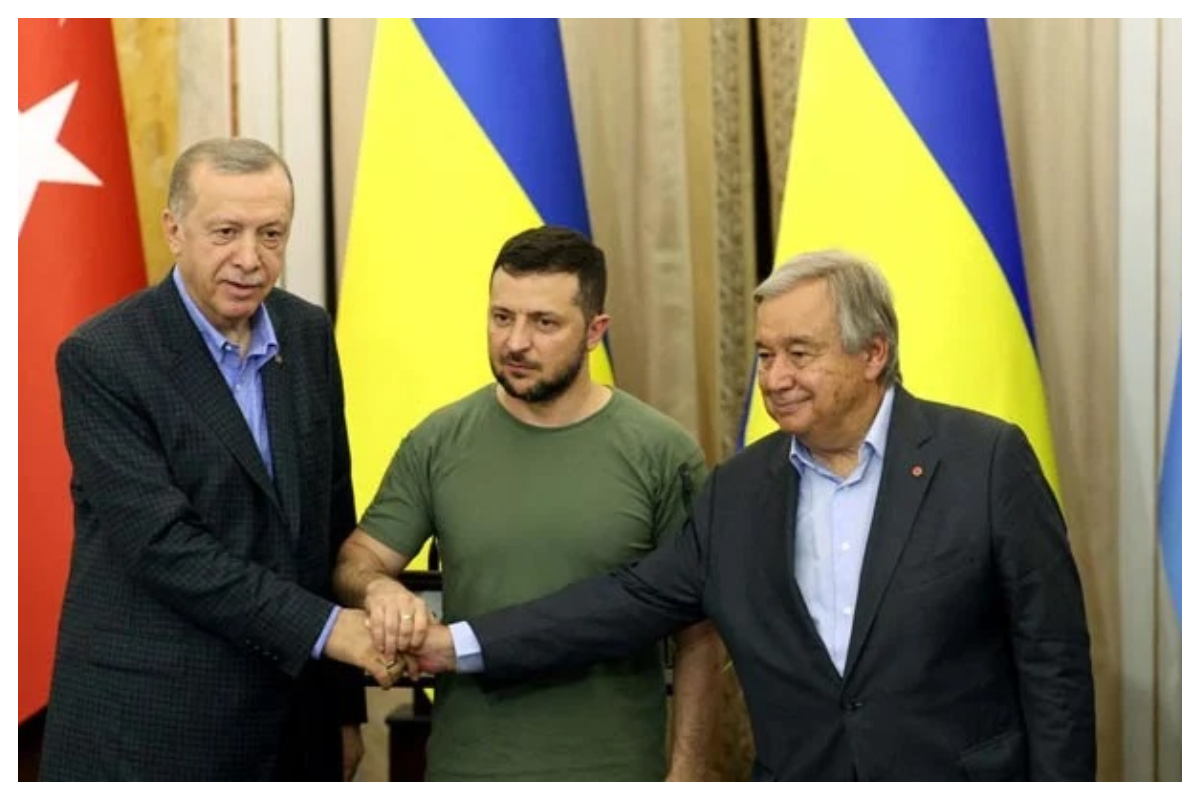- A flare-up in fighting around Europe’s largest nuclear facility in Russian-controlled southern Ukraine has sparked urgent warnings from world leaders
- We don’t want another Chernobyl,” Erdogan said during a press conference in the eastern city of Lviv
- The Turkish leader and Guterres negotiated a deal last month to resume grain exports from Ukraine after Russia’s invasion disrupted global supplies.
Erdogan warned Thursday of a nuclear disaster in Ukraine during his first face-to-face talks with President Volodymyr Zelensky since Russia’s invasion began, echoing pleas from the UN’s chief.
A flare-up in fighting around Europe’s largest nuclear facility in Russian-controlled southern Ukraine has sparked urgent warnings from world leaders and UN chief Antonio Guterres cautioned during talks with Erdogan that any damage to the plant would be akin to “suicide”.
“We are worried. We don’t want another Chernobyl,” Erdogan said during a press conference in the eastern city of Lviv, during which he also assured the Ukrainian leader that Ankara was a firm ally.
Erdogan: “We stay on the side of our Ukraine friends while seeking a solution.”
Guterres said he was “gravely concerned” about the plant and that it must be demilitarised, adding, “We must tell it like it is – any potential damage to Zaporizhzhia is suicide.”
Erdogan, who has big geopolitical conflicts with the Kremlin, met with Putin at the Black Sea resort of Sochi less than two weeks ago.
The Turkish leader and Guterres negotiated a deal last month to resume grain exports from Ukraine after Russia’s invasion disrupted global supplies.
The 25th cargo ship under the deal left Ukraine for Egypt carrying 33,000 tonnes of grain before Zelensky’s press briefing.
Ukraine and Russia are two of the world’s top grain exporters, and the halt in exports caused grain prices to jump and food crisis fears, especially in poor countries.
Guterres told reporters that the sides hoped to boost operations at three southern export ports.
The UN head praised the accord that created a secure path for cargo ships to exit Black Sea ports.
The success of the grain agreement contrasts with early unsuccessful peace talks, and Zelensky ruled out peace with Russia on Thursday.
He told reporters he was “extremely shocked” to hear President Erdogan say Russia was “ready for peace,” adding, “First they should leave our area and then we’ll see.”
Thursday saw frontline fighting.
Russian strikes killed and injured dozens in Kharkiv’s war-torn east.
Early morning bombardments in Kharkiv and neighbouring Krasnograd left at least six dead and 25 injured, one day after Russian bombardments killed 13 in Ukraine’s second-largest city.
Regional governor Oleg Synegubov released photographs from a Kharkiv strike showing burnt-out buildings and ruined vehicles.
“Kharkiv. 175 terrible days. A senior presidential assistant, Mykhaylo Podolyak, tweeted about daily terror and missile strikes on civilians.
In recent weeks, combat has centred on southern Zaporizhzhia and its nuclear plant, and Zelensky has asked the UN to assure its protection after meeting with Guterres in Lviv.
He blamed Russia for “deliberate” attacks on the site and said the UN must assure its security, demilitarisation, and freedom from Russian soldiers.
Russian soldiers grabbed the Zaporizhzhia plant in southern Ukraine in March, fueling worries of a nuclear incident like Chernobyl.
Moscow denied Ukrainian claims that its soldiers had placed heavy weaponry in Zaporizhzhia and accused Kyiv of planning a “provocation”
Russian troops have no heavy weaponry at or near the station. The ministry solely has guard troops.
NATO Secretary General Jens Stoltenberg called Russia’s seizure of the plant “serious” and demanded a withdrawal and IAEA inspections.
Friday, the UN head will visit Odessa, one of three grain export ports. He’ll then visit Turkey’s Joint Coordination Centre, the accord’s overseer.
[embedpost slug=”putin-erdogan-agree-to-boost-economic-energy-cooperation/”]




















